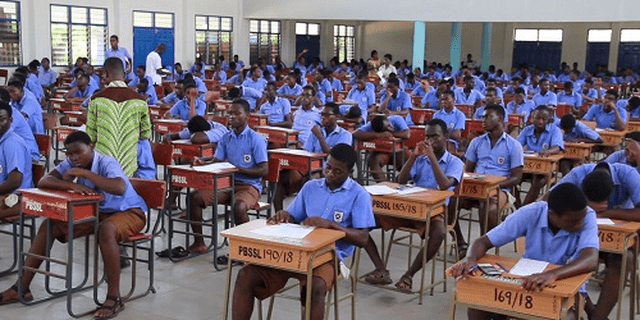Campaign Against Privatisation and Commercialisation of Education (CAPCOE) has called for the review of invigilation allowances, the ranking and reward schemes for Senior High School (SHS) teachers based on the West African Secondary School Certificate Examination (WASSCE) performance, among others, to curb examination malpractice in the country.
According to the education sector civil society organisation (CSO), among other things, the paltry remuneration of teachers and external invigilators during the WASSCE by the West African Examination Council (WAEC) over the years has been a reason why some supervisors go contrary to regulations to aid schools and students for financial compensations; hence, the need for a review.
“Poor invigilation allowance paid by WAEC to invigilators as against the risk they put themselves in remains another demotivating factor affecting the quality of invigilation. The current GH₵14 allowance per session to WASSCE invigilators, and GH₵11 per session to Basic Education Certificate Examination (BECE), totalling GH₵176 and GH₵126 to WASSCE invigilators and BECE invigilators respectively to supervise, which is normally paid after a year should be revised upward,” CAPCOE stated.
The CSO also mentioned that the over-politicisation of WASSCE and BECE results is also pushing the government to take steps that create an impression of government support to prevent cheating among students, i.e. the purchase of past questions at the expense of textbooks and other relevant resources.
Furthermore, it lamented that a poor learning environment that creates an inferiority complex among those in lower category schools also contributes to the ‘survival of the fittest’ syndrome, urging them to cheat to survive. School ranking and the embarrassment that teachers in the lower performing category suffer after results are released also contribute to the situation.
Again, CAPOE believes that steps should be taken to address over-pampering of students by human rights and political authorities that make them see cheating in exams as an entitlement. Any attempt by teachers and school authorities to prevent them from cheating is met with anger and attacks on teachers and school property. “Measures should be put in place to deal with offending candidates to deter others.”
Convener of CAPCOE, Richard Kwashie Kovey, stated that the lack of prosecution on the petitions and complaints lodged with the Director-General and CID regarding last year’s examination malpractices is highly regretted. “We call on the Police administration to expedite action on these outstanding cases if we are to deter others from repeating the same this year.
CAPCOE fully supports recommendations of other stakeholders to establish a regulatory body that would supervise and adjudicate matters of examination standards, malpractices, fraud, and misconduct,” he added.
CAPCOE also reiterated its support for the call for the establishment of other examination bodies to put to an end the monopoly of WAEC. Competition, when regulated, would boost the standards and credibility of the pre-tertiary external assessment system.
Effects of examination malpractice
According to CAPCOE, graduate employability largely depends on the credibility and reliability of the external assessment locally and internationally.
The current graduate unemployment in the country could partly be due to widespread reports on examination malpractices over the years. It was largely perceived to be a practice private institutions used to brand their schools as best performing schools, but this perception is gaining popularity among public schools in recent times.
The latest is the widespread video titled: ‘The Cheating Squad’ – a Corruption Watch investigation by Fredrick Asiamah who exposed how some invigilators were assisting candidates to cheat in the 2021 WASSCE. This followed an earlier report launched by Africa Education Watch whose underground work exposed the online sale of question papers using paid WhatsApp and Telegram platforms in the same 2021 exams.
These put the credibility of WASSCE and BECE in Ghana and those of other West African countries to question. Beyond what we see today are the future implications for the employability of our school graduates, leadership, and managerial crisis.
It is in line with this that the Campaign Against Privatisation and Commercialisation of Education (CAPCOE) would like to add its voice to the call to end the practice.










